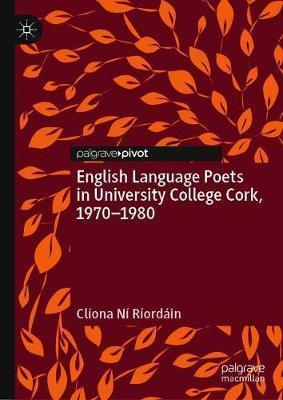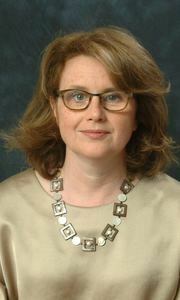
Clíona Ní Ríordáin is Professor of English at the University Sorbonne Nouvelle-Paris 3, where she teaches Irish literature and translation studies and convenes the Master’s programme in Irish Studies.
In her new book, English Language Poets in University College Cork 1970-1980 (Palgrave Macmillan, 2020), Ní Ríordáin writes about a special time in the literary world—one that occurred at a particular point of time in this university and its city on the River Lee.
Exploring a unique “generation” of poets
Perhaps a better-known cohort from the same university are the Irish-language poets known as the INNTI Poets (after a journal in which their work was published). Young poets in this group, which included Nuala Ní Dhomhnaill (a frequent visiting faculty fellow at the Institute in the last decade) occupy a special place in Ireland, Ní Ríordáin writes. Yet, she maintains that the English- and Irish-language poets should be examined as an organic whole.
It was in the 1970s that the group known now as “the Cork poets" flourished even as student writers. These poets—a group that included Greg Delanty, Theo Dorgan, Seán Dunne, Gerry Murphy, Thomas McCarthy, Gregory O’Donoghue, and Maurice Riordan—did not stumble into poetry; they were intent on the poetic life. They came to study with John Montague and Seán Lucey, both excellent mentors, and to immerse themselves in a heady atmosphere of words and the knowledge of the profound effect of those words on our identities and sense of selves.

In exploring the factors that gave rise to this unique generation of poets, Ní Ríordáin describes the 1970s as a time of profound social change—in the Catholic Church, in third-level education, and in Irish society as a whole. The poets’ lives and work in this decade were grounded in the thriving economy of the city and the sense of confidence that pervaded it.
Additionally, she notes, the line between town and gown seemed nonexistent in that decade. Poetry workshops were held within the university’s walls, but The Long Valley on Winthrop Street was the poets’ unofficial headquarters and poems were published weekly in The Cork Examiner as well as in the university student journal, The Quarryman.
Most critical to the development of this generation of poets was the mentorship they received and their spirit of comradeship. They were all, in Thomas McCarthy's words, "gardening in the rain."
Directly in the beginning of her book, Ní Ríordáin explores the obvious question: “Where were the women poets?”—a question underscored by the presence in Cork a decade earlier of the poet Eiléan Ní Chuilleanáin, the current Ireland Professor of Poetry, who contributed a foreword to the book, and Nuala Ní Dhomhnaill, a student just a few years earlier. She points to women students in Cork at the time, like Catherine Phil McCarthy and Liz O’Donoghue, whose poetry gathered force and impetus throughout the years; yet, they were not among the gardeners in the rain in the 1970s. Rather, issues of gender and the inclusion of Irish women poets had “yet to be addressed in the male-dominated literary and academic circles” covered in the book.
Strengthening a relationship with the Institute and its Irish Studies community
Ní Ríordáin visited the Keough-Naughton Institute for two weeks in October 2018. She delivered a talk on the poet Ciaran Carson and guest lectured at classes, but it was the time away from her own academic and administrative duties that allowed her to delve into the Irish Studies Collection of Notre Dame's Hesburgh Library. In addition to finalizing research for her book on the Poets of University College Cork, 1970-1980, she also began to work on a new project which explores the influence of French literature on the work of Ciaran Carson.
Ní Ríordáin's visit that fall also served to strengthen the existing partnership between the Institute and the Sorbonne’s Irish studies programme. An important Institute initiative, Global Ulysses, was just then in its early planning stages. Ní Ríordáin agreed to be the conference's Paris convener and was then instrumental in securing the participation of both Ireland’s embassy in Paris and her own frequent collaborator, the Centre Culturel Irlandais, which agreed to serve as the venue for the Paris leg of the three-city conference. She had lined up speakers and was at work arranging a Sorbonne/Notre Dame graduate student Global Ulysses day as well as a non-academic Parisian Ulysses reading group when the pandemic struck—and put plans on the conference on hold until the centenary year of the book: 2022.
For further reading:
English Language Poets in University College Cork 1970-1980 (Palgrave Macmillan, 2020)
"Cork in the 1970s: Breeding ground for a school of poets," Clíona Ní Ríordáin, The Irish Times, 14 April 2020